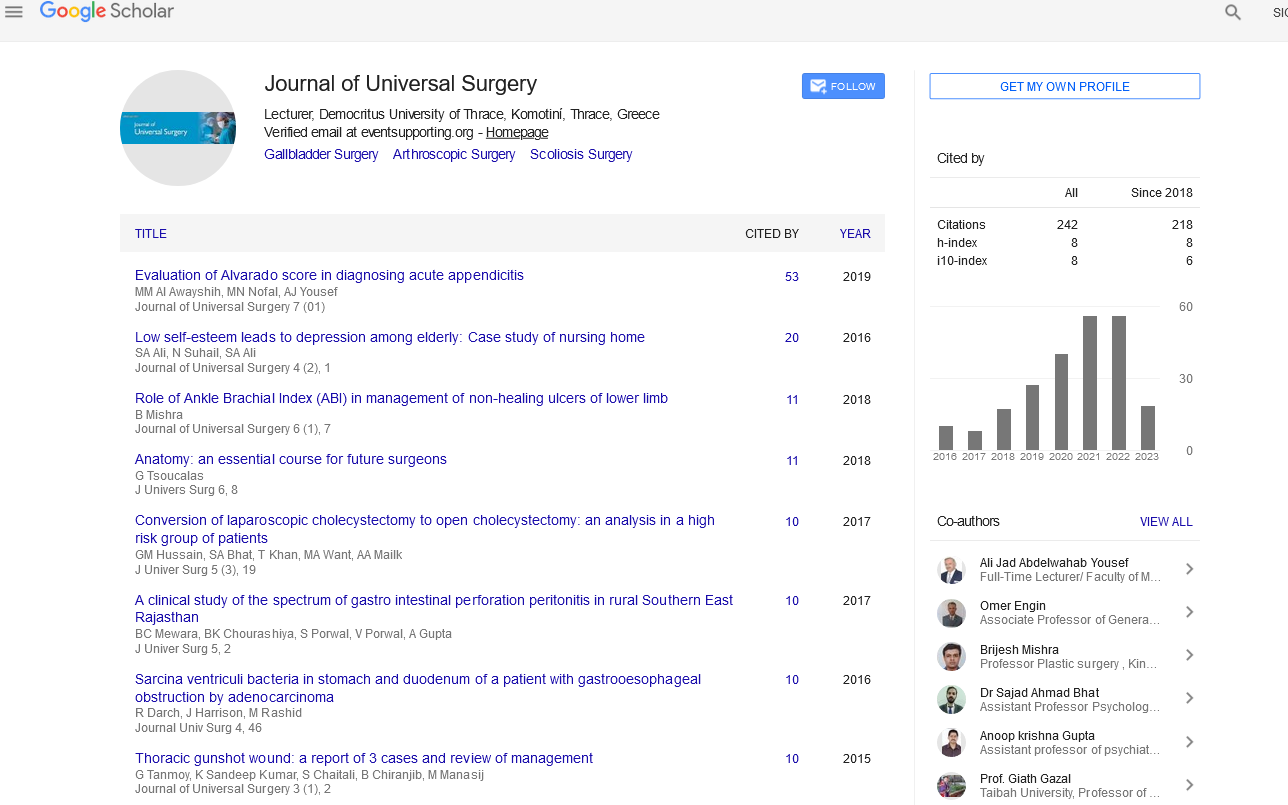Perspective - (2024) Volume 12, Issue 5
Oral Surgery Training: A Comprehensive Overview
Rakesh Vutturi*
Department of Oral Surgeon, Thadipathry University, Thadipathry, India
*Correspondence:
Rakesh Vutturi, Department of Oral Surgeon, Thadipathry University, Thadipathry,
India,
Email:
Received: 25-Sep-2024, Manuscript No. IPJUS-24-15232;
Editor assigned: 30-Sep-2024, Pre QC No. IPJUS-24-15232 (PQ);
Reviewed: 14-Oct-2024, QC No. IPJUS-24-15232;
Revised: 21-Oct-2024, Manuscript No. IPJUS-24-15232 (R);
Published:
29-Oct-2024
Introduction
Oral surgery is a specialized branch of dentistry that focuses
on diagnosing and surgically treating conditions affecting the
mouth, jaw and face. It is a complex and technical field that
requires years of rigorous education, hands-on training and a
commitment to continuous learning. Oral surgeons, also known
as Oral and Maxillofacial Surgeons (OMS), perform a wide range
of procedures, including tooth extractions, dental implants,
corrective jaw surgery and treatment of facial trauma.
This article will explore the training path for oral surgery,
highlighting key aspects of the educational journey, surgical skills
required and the evolving demands in this specialized field of
healthcare.
Description
Educational path to oral surgery
The journey to becoming an oral surgeon begins with a solid
foundation in dentistry, followed by specialized training in oral
surgery. This educational path generally spans a decade or more,
depending on the country or region of training.
Undergraduate education: Aspiring oral surgeons must first
complete an undergraduate degree, typically focusing on
biology, chemistry or other pre-dental courses. This
undergraduate phase serves as a prerequisite for admission to
dental school. A strong academic background, particularly in the
sciences, is crucial, as competition for dental school placements
is often intense.
Dental school: After completing an undergraduate degree,
candidates must attend an accredited dental school for four
years, earning a Doctor of Dental Surgery (DDS) or Doctor of
Dental Medicine (DMD) degree. Dental school provides
foundational knowledge in dental anatomy, physiology and the
treatment of oral diseases. In the final years, students gain
hands-on experience through clinical practice, performing basic
dental procedures under supervision.
During this time, students interested in oral surgery often
seek out oral surgery-related electives, clinical rotations and
shadowing opportunities to build familiarity with the specialty.
Academic performance during dental school is a significant
factor in securing a position in an oral surgery residency.
Oral and maxillofacial surgery residency
Following dental school, aspiring oral surgeons must undergo
a rigorous residency program specifically focused on oral and
maxillofacial surgery. These residency programs typically last
four to six years, depending on the structure and whether a
Medical Degree (MD) is included in the training. The residency is
the most critical phase of training, where theoretical knowledge
is translated into surgical expertise.
Structured curriculum: Oral surgery residency programs
provide a comprehensive curriculum covering all aspects of oral
and maxillofacial surgery, including but not limited to:
In the first years of residency, the training focuses on medical
and surgical principles, including anesthesia, patient
management and emergency care. Residents also rotate
through various medical departments, such as general surgery,
plastic surgery and anesthesiology, to gain a holistic
understanding of surgical care.
Hands-on surgical training: A significant portion of residency
training is spent in the operating room, where residents perform
a variety of oral and maxillofacial surgical procedures under the
guidance of experienced surgeons. As residents progress, they
take on more complex cases and assume greater responsibilities,
ultimately preparing them for independent practice.
Research and continuing education: In addition to clinical
training, many residency programs emphasize research.
Residents may be required to complete research projects related
to oral surgery, contributing to the body of knowledge in the
field. This research component fosters critical thinking,
evidence-based practice and innovation in surgical techniques.
Furthermore, oral surgery residents are encouraged to attend
conferences, workshops and seminars to stay updated on the
latest advancements in the field. Continuous learning is
essential, as new technologies and methods are constantly
emerging in oral surgery.
Advanced fellowship training
For oral surgeons who wish to further specialize in a particular
area, fellowship training is an option after completing a
residency. Fellowships typically last one to two years and offer
focused training in areas such as.
• Head and neck oncology
• Craniofacial surgery
• Cosmetic facial surgery
• Pediatric oral and maxillofacial surgery
These fellowships provide in-depth expertise in highly
specialized procedures, allowing surgeons to further refine their
skills and become leaders in niche areas of oral surgery.
Licensing and certification
Upon completion of an oral and maxillofacial surgery
residency (and fellowship, if pursued), candidates must obtain a
professional license to practice. Licensing requirements vary by
country or state, but they typically include passing written
and oral board examinations.
In the United States, for example, oral surgeons must pass the
American Board of Oral and Maxillofacial Surgery (ABOMS)
certification exam. This certification is a testament to the
surgeon’s expertise, commitment to quality care and adherence
to professional standards.
Many oral surgeons also pursue certification in advanced
anesthesia techniques, as they are trained to administer both
local and general anesthesia during surgical procedures.
Conclusion
Oral surgery training is an intensive and comprehensive
process that equips individuals with the expertise to handle
complex surgical procedures in the mouth, jaw and face. The
journey requires dedication, perseverance, and a commitment
to lifelong learning. With advances in technology and
interdisciplinary collaboration, oral surgeons are at the forefront
of providing.
Citation: Vutturi R (2024) Oral Surgery Training: A Comprehensive Overview. J Univ Surg Vol.12 No.5: 049.





